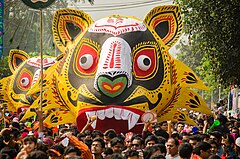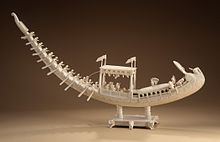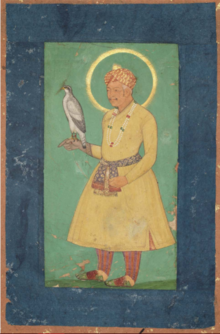Pohela Boishakh: Difference between revisions
m Disambiguating links to Bengali (link changed to Bengalis) using DisamAssist. |
Tithi.sarkar (talk | contribs) corrected grammar Tags: Visual edit Mobile edit Mobile web edit Advanced mobile edit |
||
| Line 8: | Line 8: | ||
|caption = Pahela Baishakh celebration in [[Dhaka]], [[Bangladesh]] |
|caption = Pahela Baishakh celebration in [[Dhaka]], [[Bangladesh]] |
||
|official_name = Pahela Baishakh / পহেলা বৈশাখ <ref name=samayeen159>{{cite book|author1=Nubras Samayeen|author2=Sharif Imon|editor=Kapila D. Silva and Amita Sinha|title=Cultural Landscapes of South Asia: Studies in Heritage Conservation and Management|url=https://books.google.com/books?id=Tc1CDQAAQBAJ |year=2016|publisher=Taylor & Francis|isbn=978-1-317-36592-1|pages=159–160}}</ref> |
|official_name = Pahela Baishakh / পহেলা বৈশাখ <ref name=samayeen159>{{cite book|author1=Nubras Samayeen|author2=Sharif Imon|editor=Kapila D. Silva and Amita Sinha|title=Cultural Landscapes of South Asia: Studies in Heritage Conservation and Management|url=https://books.google.com/books?id=Tc1CDQAAQBAJ |year=2016|publisher=Taylor & Francis|isbn=978-1-317-36592-1|pages=159–160}}</ref> |
||
|observedby = [[Bengalis |
|observedby = [[Bengalis]] |
||
|longtype = Social, cultural and national festival |
|longtype = Social, cultural and national festival |
||
|duration = 1 day |
|duration = 1 day |
||
Revision as of 22:04, 15 April 2021
| Pahela Baishakh (পহেলা বৈশাখ) | |
|---|---|
 Pahela Baishakh celebration in Dhaka, Bangladesh | |
| Official name | Pahela Baishakh / পহেলা বৈশাখ [1] |
| Observed by | Bengalis |
| Type | Social, cultural and national festival |
| Celebrations | Mangal Shobhajatra (processions), Boishakhi Mela (fair), gift-giving, visiting relatives and friends, songs, dance. |
| Date | 14th April (15th April in India) |
| Frequency | Annual |
| Related to | South and Southeast Asian solar New Year |
| Part of a series on the |
| Culture of Bengal |
|---|
 |
| History |
| Cuisine |
Pahela Baishakh (Bengali: পহেলা বৈশাখ, romanized: Pahela Boishakh) or Poila Baishak is the first day of the Bengali calendar which is the official calendar of Bangladesh. This festival is celebrated on 14 April in Bangladesh and 14/15 April in the Indian states of West Bengal, Tripura, and Assam (Barak Valley) by Bengalis regardless of religious faith.[2]
Celebration of Pahela Baishakh traces its roots back to Mughal rule in this region and also the proclamation of tax collection reforms of Akbar.[3]
The festival is celebrated with processions, fairs and family time. The traditional greeting for Bengalis in the new year is শুভ নববর্ষ "Shubho Noboborsho" which is literally "Happy New Year". The festive Mangal Shobhajatra is organized in Bangladesh. In 2016, the UNESCO declared this festivity organized by the Faculty of Fine Arts, University of Dhaka as a cultural heritage of humanity.[4]
History and origin
Nomenclature
In Bengali, the word Pahela (Bengali: পহেলা) means 'first' and Boishakh (Bengali: বৈশাখ) is the first month of the Bengali calendar (Bengali: পহেলা বৈশাখ Pahela Boishakh).[5] Bengali New Year is referred to in Bengali as Nobo Borsho (Bengali: নববর্ষ), where 'Nobo' means new and 'Borsho' means year.[6] [7]

Traditional roots
During the Mughal rule, land taxes were collected from Bengali people according to the Islamic Hijri calendar. This calendar was a lunar calendar, and its new year did not coincide with the solar agricultural cycles. According to some sources, the festival was a tradition introduced in Bengal during the rule of Mughal Emperor Akbar to time the tax year to the harvest, and the Bangla year was therewith called Bangabda. Akbar asked the royal astronomer Fathullah Shirazi to create a new calendar by combining the lunar Islamic calendar and solar Hindu calendar already in use, and this was known as Fasholi shan (harvest calendar). According to some historians, this started the Bengali calendar. According to Shamsuzzaman Khan, it could be Nawab Murshid Quli Khan, a Mughal governor, who first used the tradition of Punyaho as "a day for ceremonial land tax collection", and used Akbar's fiscal policy to start the Bangla calendar.[8][9]
According to Shamsuzzaman Khan,[10] and Nitish Sengupta, the origin of the Bengali calendar is unclear.[11] According to Shamsuzzaman, it is called Bangla shon or shaal, which are Arabic (سن) and Persian (سال) words respectively, suggests that it was introduced by a Muslim king or sultan."[10] In contrast, according to Sengupta, its traditional name is Bangabda.[11][12] It is also unclear, whether it was adopted by Alauddin Husain Shah or Akbar. The tradition to use the Bengali calendar may have been started by Husain Shah before Akbar.[11] Regardless of who adopted the Bengali calendar and the new year, states Sengupta, it helped collect land taxes after the spring harvest based on traditional Bengali calendar, because the Islamic Hijri calendar created administrative difficulties in setting the collection date.[11]
Contemporary usage
In Bangladesh however, the old Bengali calendar was modified in 1966 by a committee headed by Muhammad Shahidullah, making the first five months 31 days long, rest 30 days each, with the month of Falgun adjusted to 31 days in every leap year.[13] This was officially adopted by Bangladesh in 1987. Since then, the national calendar starts with and the new year festival always falls on 14 April in Bangladesh.[13]
Holiday customs
This section needs expansion. You can help by adding to it. (April 2021) |
House cleaning and shopping
Visiting family and friends
During Pahela Baishakh people visit their families and friends and spend time together. Pahela Baishakh is also known for uniting friends and family.
New day salutation
Haal Khata
Haal Khata is a festival celebrated on the occasion of Pohela Baishakh in order to complete all the reckonings of last year and open a new ledger. It is observed by the bengali businessmans,shopkeepers and traders.
Red-White attire
Baishakhi meal
Usually, Bengali people eat Panta bhat or poitabhat, which is a rice-based dish prepared by soaking rice, generally leftovers, in water overnight. It is popularly eaten with Hilsha Fish and other curries.[14]
Mangal shobhajatra
Baishakhi rural fair
Locality
Bangladesh

The Bengali New Year is observed as a public holiday in Bangladesh. It is celebrated across religious boundaries by its Muslim majority and Hindu minority.[16] According to Willem van Schendel and Henk Schulte Nordholt, the festival became a popular means of expressing cultural pride and heritage among the Bangladeshi as they resisted Pakistani rule in the 1950s and 1960s.[17]
The day is marked with singing, processions, and fairs. Traditionally, businesses start this day with a new ledger, clearing out the old. Singers perform traditional songs welcoming the new year. People enjoy classical jatra plays. People wear festive dress with women desking their hair with flowers. White-red color combinations are particularly popular.[18]
Bangladeshis prepare and enjoy a variety of traditional festive foods on Pohela Boishakh. These include panta bhat (watered rice), ilish bhaji (fried hilsa fish) and many special bhartas (pastes).[19][18]
In Dhaka


The celebrations start in Dhaka at dawn with a rendition of Rabindranath Tagore's song "Esho he Boishakh" by Chhayanaut under the banyan tree at Ramna (the Ramna Batamul). An integral part of the festivities is the Mangal Shobhajatra, a traditional colourful procession organised by the students of the Faculty of Fine Arts, University of Dhaka (Charukala). According to the history, the rudimentary step of Mangal Shobhjatra was started in Jessore by Charupith, a community organization, in 1985. Later in 1989 the Faculty of Fine Arts, University of Dhaka arranged this Mangal Shobhajatra with different motives and themes. Now, the Mangal Shobhajatra is celebrated by different organization in all over the country.[20]
The Dhaka University Mangal Shobhajatra tradition started in 1989 when students used the procession to overcome their frustration with the military rule. They organized the festival to create masks and floats with at least three theme, one highlighting evil, another courage, and a third about peace.[4] It also highlighted the pride of Bangladeshi people for their folk heritage irrespective of religion, creed, caste, gender or age.[4]
In recent years, the procession has a different theme relevant to the country's culture and politics every year. Different cultural organizations and bands also perform on this occasion and fairs celebrating Bengali culture are organized throughout the country. Other traditional events held to celebrate Pohela Boishakh include bull racing in Munshiganj, wrestling in Chittagong, boat racing, cockfights, pigeon racing.[21]
In Chittagong
Pohela Boishakh celebrations in Chittagong involves similar traditions of that in Dhaka. The students of the fine arts institute of Chittagong University brings the Mangal Shobhajatra procession in the city, followed by daylong cultural activities.[22]
At DC hill & CRB, a range of cultural programmes are held by different socio-cultural and educational organisations of the city. The Shammilito Pohela Boishakh Udjapon Parishad holds a two-day function at the hill premises to observe the festival, starting with Rabindra Sangeet recitations in the morning. In the late afternoon, through evening, Chaitra Sangkranti programme is held to bid farewell to the previous year.[22]
At the Chittagong Shilpakala Academy, different folk cultures, music, dances, puppet shows are displayed.[22]
India

Bengali people of India have historically celebrated Poyla Boishakh, and it is an official regional holiday in its states of West Bengal and Tripura. The day is also called Nabo Barsho.[23]
West Bengal
Poyla Boishakh has been the traditional New Year festival in the state, with the new year referred to as the Noboborsho.[6] The festival falls on 14 or 15 April, as West Bengal follows its traditional Bengali calendar, which adjusts for solar cycle differently than the one used in Bangladesh where the festival falls on 14 April.[24]
Notable events of West Bengal include the early morning cultural processions called Prabhat Pheri. These processions see dance troupes and children dressed up with floats, displaying their performance arts to songs of Rabindra Nath Tagore.[25]
Tripura and northeast India
Poyla Boishakh is a state holiday in Tripura. People wear new clothes and start the day by praying at the temples for a prosperous year. The day marks the traditional accounting new year for merchants.[26][27][27] Festive foods such as confectionery and sweets are purchased and distributed as gifts to friends and family members.[27]
The festival is also observed by the Bengali communities in other eastern states such as Assam.[28]
Celebration in other countries
Bangladesh Heritage and Ethnic Society of Alberta in Canada celebrates its Heritage Festival (Bengali New Year) in a colorful manner along with other organizations. Bengali people in Calgary celebrate the day with traditional food, dress, and with Bengali culture.[29][30] The Bangabandhu Council of Australia also hosts a Pohela Boishakh event at the Sydney Olympic Park.[31]
See also
- Bengali Renaissance
- List of festivals in Bangladesh
- Festivals of West Bengal
- Pohela Falgun
- Haal Khata
- Nowruz
- Kha b-Nisan
Gallery
-
Children in Bangladesh carrying placards in Pohela Boishakh's rally
-
Children in Bangladesh carrying colorful placards in Pohela Boishakh's rally
-
Girls in Bangladesh wearing traditional saris and flower crowns at Pohela Boishakh celebration in Chittagong
-
Art competition at Pohela Boishakh celebration in Chittagong
-
Colorful show pieces in a Boishakhi fair stall
-
Pohela Boishakh Celebration by the Women Association, Abudhabi, UAE
-
A motif of sun at Mangal Shobhajatra procession in Pohela Boishakh celebration at Dhaka
References
- ^ Nubras Samayeen; Sharif Imon (2016). Kapila D. Silva and Amita Sinha (ed.). Cultural Landscapes of South Asia: Studies in Heritage Conservation and Management. Taylor & Francis. pp. 159–160. ISBN 978-1-317-36592-1.
- ^ Kapila D. Silva; Amita Sinha (2016). Cultural Landscapes of South Asia: Studies in Heritage Conservation and Management. Taylor & Francis. pp. 159–162. ISBN 978-1-317-36592-1.
- ^ Chakrabarti, Kunal (2013). Historical dictionary of the Bengalis. Shubhra Chakrabarti. Lanham [Maryland]. ISBN 978-0-8108-8024-5. OCLC 861692768.
{{cite book}}: CS1 maint: location missing publisher (link) - ^ a b c Mangal Shobhajatra on Pahela Baishakh, UNESCO
- ^ Kapila D. Silva; Amita Sinha (2016). Cultural Landscapes of South Asia: Studies in Heritage Conservation and Management. Taylor & Francis. pp. 161–168. ISBN 978-1-317-36592-1., Quote: "Poyla Boishakh is celebrated on the first day of Boishakh, the first month of the Bengali calendar. It falls on 14 April in the Gregorian calendar, and it coincides with similar Vedic calendar-based New Year celebrations (...)"
- ^ a b William D. Crump (2014). Encyclopedia of New Year's Holidays Worldwide. McFarland. p. 113114. ISBN 978-0-7864-9545-0., Quote: "Nobo Barsho ("New Year"). Hindu New Year festival in West Bengal State, observed on the first day of the month of Vaishakh or Baisakh (corresponds to mid-April). New Year's Day is known as Poila Boishakh (First of Baisakh)."
- ^ "Subho Poila Baisakh". Bangla Love Story. Retrieved 28 March 2021.
- ^ Chakrabarti, Kunal (2013). Historical dictionary of the Bengalis. Shubhra Chakrabarti. Lanham [Maryland]. ISBN 978-0-8108-8024-5. OCLC 861692768.
{{cite book}}: CS1 maint: location missing publisher (link) - ^ "Pahela Baishakh". Banglapedia. Dhaka, Bangladesh: Asiatic Society of Bangladesh. 2015.
- ^ a b Guhathakurta, Meghna; Schendel, Willem van (2013). The Bangladesh Reader: History, Culture, Politics. Duke University Press. pp. 17–18. ISBN 9780822353188.
- ^ a b c d Nitish K. Sengupta (2011). Land of Two Rivers: A History of Bengal from the Mahabharata to Mujib. Penguin Books India. pp. 96–98. ISBN 978-0-14-341678-4.
- ^ Syed Ashraf Ali, Bangabda, National Encyclopedia of Bangladesh
- ^ a b Kunal Chakrabarti; Shubhra Chakrabarti (2013). Historical Dictionary of the Bengalis. Scarecrow. pp. 114–115. ISBN 978-0-8108-8024-5.
- ^ Correspondent, Staff. "Pahela Baishakh down the years". Prothomalo. Retrieved 13 April 2021.
{{cite web}}:|last=has generic name (help) - ^ Mongol Shobhojatra on Pahela Boishakh
- ^ Kapila D. Silva; Amita Sinha (2016). Cultural Landscapes of South Asia: Studies in Heritage\n" Conservation and Management. Taylor & Francis. pp. 159–168. ISBN 978-1-317-36592-1.
- ^ Willem van Schendel; Henk Schulte Nordholt (2001). Time Matters: Global and Local Time in Asian Societies. VU University\n\t" Press. p. 41. ISBN 978-90-5383-745-0.
- ^ a b Meghna Guhathakurta; Willem van Schendel (2013). The Bangladesh Reader: History, Culture, Politics. Duke University Press. pp. 17–21. ISBN 978-0-8223-9567-6.
- ^ Vishweshwaraiah Prakash; Olga Martin-Belloso; Larry Keener; et al., eds. (2016). Regulating Safety of Traditional and Ethnic Foods. Elsevier Science. p. 104. ISBN 978-0-12-800620-7.
- ^ মঙ্গল শোভাযাত্রা (Non-English source)
- ^ "Nobo Borsho and Pahela Baishakh: The Past and the Present". The Daily Star. 14 April 2013.
- ^ a b c Chakraborty, Pranabesh. "Chittagong set to welcome Bangla New Year". The Daily Star. Retrieved 7 April 2017.
- ^ William D. Crump (2014). Encyclopedia of New Year's Holidays Worldwide. McFarland. pp. 114–115. ISBN 978-0-7864-9545-0.
- ^ Kunal Chakrabarti; Shubhra Chakrabarti (2013). Historical Dictionary of the Bengalis. Scarecrow. pp. 114–115. ISBN 978-0-8108-8024-5.
- ^ 'Poila Baisakh' celebrated in West Bengal, Press Trust of India (15 April 2015)
- ^ Pahela Baisakh celebrated in Tripura, Bangladesh News (15 April 2014)
- ^ a b c Tripura people observed Pahela Baishakh, Financial Express (14 April 2016)
- ^ Celebrating New Year all year long!, The Statesman, 29 December 2016
- ^ "Naba Barsha in Bengal". Retrieved 5 May 2016.
- ^ http://bhesa.ca/index.php/events/events-bengali-event-heritage
- ^ "BOISHAKHI MELA". Boishakhi Mela. Retrieved 4 April 2018.
32. Bengali Calendar - Bangla Calendar, Bengali Calendar, Bangla Ponjika
External links
- Pohela Boishakh 1425
- Modern Times in Bangladesh, H.W. van Schendel (2001)
- Pahela Baishakh Pahela Baishakh Utsab
- Bangladeshi culture
- Culture of West Bengal
- April observances
- Festivals of Bangladeshi culture
- Events in Bangladesh
- Public holidays in Bangladesh
- Folk festivals in Bangladesh
- Food and drink festivals in Bangladesh
- Cultural festivals in Bangladesh
- Annual events in Bangladesh
- Harvest festivals
- Festivals in India
- New Year in India
- Spring (season) events in Bangladesh
- New Year celebrations







